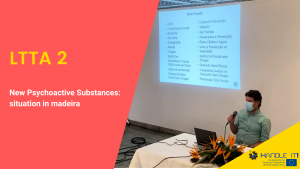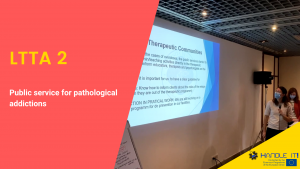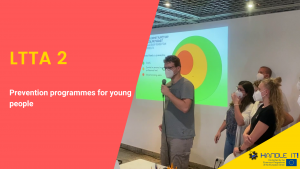Meeting in Madeira (Portugal), 25th to 29th of October 2021
Topic: Prevention and outpatient treatment
The LTTA on “Prevention and Outpatient Treatment,” organized by IREFREA Portugal, took place from October 25 to 29 in the Autonomous Region of Madeira. It was initially scheduled for Lisbon. However, due to the pandemic and safety concerns, it was forced to relocate to Madeira.
This LTTA examined preventive and outpatient training in each of the participating nations on new substances. Dr Fernando Mendes, the coordinator of Irefrea Portugal, lectured on the first morning on how prevention and treatment are two sides of the same coin. These two interventions, which occur in the same region of additions, appear to have nothing in common and are framed as opposites, but they are, in fact, two sides of the same coin.
The Prevention and ent of Addictions must share knowledge and techniques to achieve mutual understanding. We must be aware of the influence and evolution of new psychoactive drugs as they become available. In the afternoon, regional health and civil protection officials unveiled the region’s drug-fighting strategy and legislative measures (adopted by the Madeira legislative assembly) to close smart stores.
We want to remind you that one of the ERASMUS PLUS project’s objectives is to engage and benefit local partners and guests. Throughout the week, we had colleagues from the region’s field of addiction therapy present their work. Dr Dirk Kratz discussed the project and its accomplishments, while Dr Thomas Legl discussed the Euro-Tc network and global projects. On the first day, we were interviewed by local media, and there were numerous news pieces regarding this happening.
On the second day, we heard from the local prevention and regional treatment teams about the facts and their reactions to using these new drugs on the island. On the second day, we discussed the presentations made by each country regarding psychoactive substances. We talk about how our governments are dealing with this issue.
After a successful third-day “global café” on prevention and treatment, we reached some exciting and substantial conclusions for our future work and possibly a new project in this area. Afternoon activities resumed, with several groups established to compose and organize the final product. On the fourth day of the project, participants worked on tasks and activities in preparation for the results and product presentations. We emphasized the survey to be undertaken among technicians in this field, whose results will help us better appreciate what is done and what might be improved.
This afternoon, several Handle-it components attended a meeting of the Euro-Tc network.
This year’s workshop culminated with Prof. Felix de Carvalho (PharmD PhD ERT) presentation of the Oporto University’s Laboratory of Toxicology, Department of Biological Sciences, Faculty of Pharmacy, on Emerging Psychoactive Substances: Challenges. It was an energizing and educational lecture. Despite his highly technical approach, we were enthralled by this researcher’s work for the two hours he spent with us. We couldn’t have asked for a more qualified person to explain this complex subject.
Dr Dirk Kratz synthesized our work this morning in a lively and participatory group dynamics session, during which we shared our work and experiences from this fantastic LTTA.
We left the meeting with a sense of accomplishment, a group attitude of incredible sharing and intimacy, and a sense of loss. We stressed how easy it is to work together despite variations in practice and language hurdles. The group members were said to have a close bond that was marked by transparency and candour. The excellent weather, the island’s beauty, and the people’s kindness contributed to our grief at leaving.
We will now work in each country to finalize the project and deliver goods and services to our international partners.

New Psychoactive Substances: situation in madeira
Sérgio Cunha from the UCAD Madeira team (Operational Unit for Interventions on Addictive Behaviours and Dependence), discusses the on-site preventative care structure and provides insight into the national survey on drug use in the Portuguese population. He also discusses earlier initiatives against NPS as well as the current situation in Madeira.

Public service for pathological addictions
The project participants of the partner organisation “Comunità di Venezia Società Cooperativa Sociale” report on their prevention programmes and on the current situation of NPS in Italy.

Prevention programmes for young people
Participants from Hungary’s partner organization “Megálló Group”, who operate in an outpatient facility, discuss their various preventative offerings, such as in schools or at festivals.

